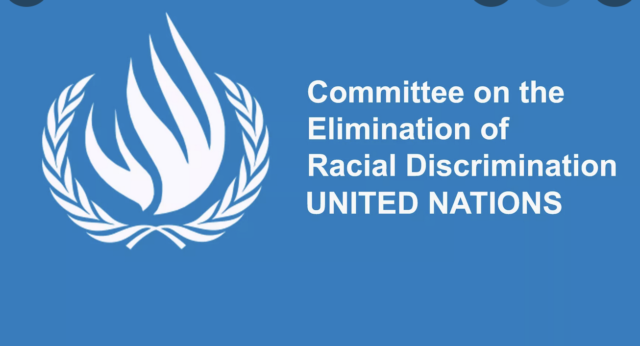The United Nations Committee on the Elimination of Racial Discrimination (CERD) has taken the extraordinary measure to request a response from the United States regarding allegations of human rights violations against the Anishinaabe associated with the Enbridge Line 3 pipeline construction.
On March 29, 2021, Honor the Earth and Giniw Collective submitted a Request for Early Warning Measures to CERD as part of an international strategy to elevate the human rights violations perpetuated by the U.S. and the state of Minnesota as to construction of the Enbridge Line 3 pipeline. This petition requested immediate intervention from CERD and detailed the continuing violations of Indigenous Peoples’ rights, including the right to free, prior, and informed consent; the right to health; the right to culture; and the right to security and to be free from violence.
On August 31, CERD published a letter to the U.S. Government dated August 25, requesting that the U.S. respond to these allegations. The letter notes, among other things, that these rights violations would amount to a violation of the International Convention on the Elimination of All Forms of Racial Discrimination (ICERD), which the U.S. has signed and ratified.
The letter requests that the U.S. Government provide information on how it guarantees the right to free, prior, and informed consent; prevents adverse impacts of the pipeline on the Anishinaabe and their culture, health, and environment; guarantees the right to an effective remedy to these rights violations; and prevents violence against Indigenous women and excessive force against protestors.
Giving focus to treaty rights violations – a first for CERD in engagements with the U.S. – the Committee also requested that the U.S. “provide details on the status of the treaties concluded between the Anishinaabe indigenous peoples and the Government of the United States of America and on measures adopted to guarantee the respect of the rights of the Anishinaabe under such treaties,” specifically usufructuary rights upheld by the Supreme Court’s ruling in Minnesota v. Mille Lacs Band of Chippewa Indians. CERD asked that the U.S. respond to its query by October 15, 2021.
“We are grateful that the United Nations has responded to our request and recognized the incalculable harms from the Line 3 expansion to the Anishinaabe people, treaty territory and the manoomin wild rice,” said Winona LaDuke, Executive Director of Honor the Earth.
“We hope that the United States takes the CERD inquiry seriously and meets the deadline for the response. Support for Line 3 from the Biden Administration and the State of Minnesota has led to a worsening situation for people, water, land and our sacred wild rice.”
Since the petition was submitted in March, over 600 arrests and citations have been made to those peacefully protesting the expansion (with some reporting as many as 800), there have been increased reports of human rights violations and violence against Indigenous women around Line 3 construction, and a preliminary report from Enbridge shows at least 28 spills during construction, affecting 12 river crossings with leaks of up to 9,000 gallons.
Following a meeting in August with the U.N. Special Rapporteur on Human Rights Defenders, Tara Houska, founder of Giniw Collective, stated, “Enbridge threatens Anishinaabe cultural survival, the drinking water of millions, and the public’s trust. Since the U.S. government is yet again failing Indigenous people and future generations, we turn to the international community. The world is watching.”
“When U.S. policy inadequately considers the rights of Indigenous Peoples, international mechanisms such as the UN Committee on the Elimination of Racial Descrimination are crucial to prevent the devastating impacts that cannot be undone once they occur,” said Kate Finn, Executive Director of First Peoples Worldwide, which filed the petition on behalf of Honor the Earth and Giniw Collective. “The letter from the Committee plainly articulates the allegations of rights violations attendant to Line 3 and the ways in which the actions of the U.S. Government fail to respect those rights and, in turn, perpetuate racial discrimination.”
Despite support of the Line 3 project by the Administration and recent affirmation of permits from Minnesota courts, the White Earth Band of Ojibwe is moving forward a rights of nature lawsuit to protect the sacred manoomin wild rice.
“The construction of these pipelines is threatening to burn our wild rice and to destroy our delicate wetlands as we speak. This is our land. We have no place to move,” wrote LaDuke in The Hill. “The new Line 3 pipeline… is going to carry three times more oil than its predecessor. While called a replacement, it’s really a new line, torn through the heart of the Anishinaabe territory that was designated in the 1855 treaty, lands protected by the Supreme Court and by U.S. government agreements with our ancestors. Despite this protection, our rivers and rice face a potential threat by the construction of Enbridge Line 3.”







